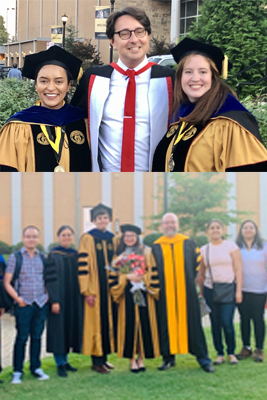

If you take full advantage of all the available opportunities, by the time you graduate, you should be well prepared to pursue a career in the private or public sector as a "practicing academic" and/or a tenure-track faculty at a university.

The objectives of a PhD degree program should be twofold: (1) train individuals to be independent researchers AND (2) offer a pathway to become a "thought leader" in your field of study. This means that a PhD curriculum should include heavy emphasis on the theoretical and evidence-based knowledge of the field and the technical skills to understand and carry out research. Importantly, faculty also recognize that doctoral educated leaders to be need more than just technically competent, they also need oral and written communication skills, teamwork, and the ability to apply current research to business, legal, ethical, and scholarly problems. There is still a role for public intellectuals.
During the course of a PhD program, faculty expect that you will participate in curricular and co-curricular activities. Why? Because not everything that makes up a Ph.D. program is found in the course catalog or on plan of study. In fact, many of the lessons that prepare you for a career as a Ph.D. educated individual will be learned outside the classroom. These lessons might include:
These experiences teach latent skills like time management, team building, and producing high-quality deliverables on a timeline, which are expectations for you once you earn the title “Dr.”
...not everything that makes up a Ph.D. program is found in the course catalog or on plan of study.
If you take full advantage of all the available opportunities, by the time you graduate,
you should be well prepared to pursue a career in the private or public sector as
a "practicing academic" and/or a tenure-track faculty at a university. As you look
at all the materials available about potential PhD programs and/or progress through
your program keep these important points in mind.
A final note, while I sometimes find myself reflecting on my own experiences as a student that is getting further in the rearview mirror each year. Faculty may regale you with their stories (which are often parables or fables of sorts for you about an issue you are bringing to us) but your experience is your own. Increasingly, forums like LinkedIn and Twitter are places where PhD students and faculty go to share their experiences and stories. It can be isolating being a student, but remember that the faculty really are there to help you succeed.
Original blog post by Dr. Sherrill Hayes.